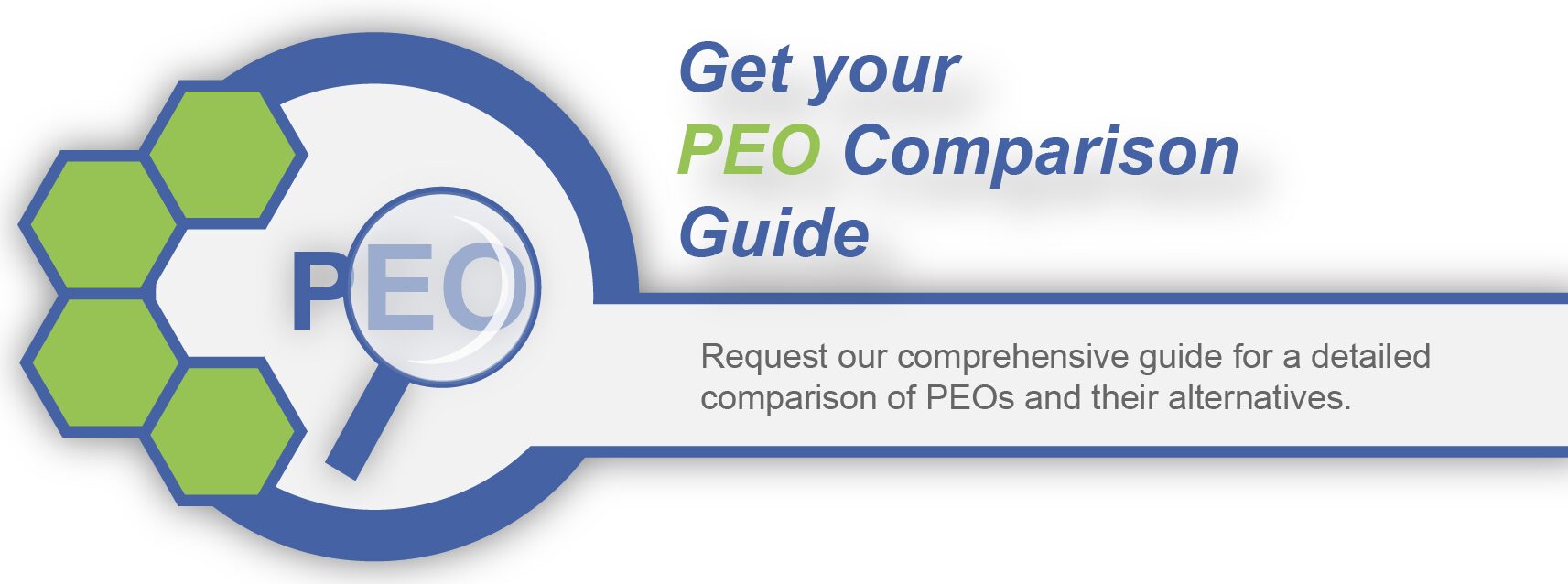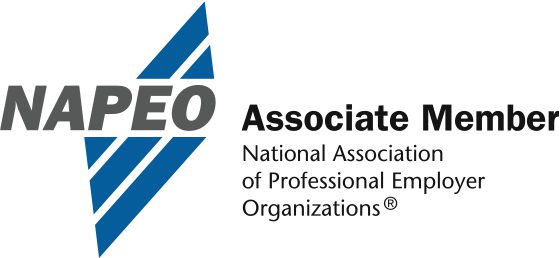When it comes to managing your organization’s HR, it’s easy to be overwhelmed.
After all, this critical area encompasses far more than hiring and firing; it also covers a broad spectrum of responsibilities from payroll and benefits administration, to compliance with ever-changing labor laws, training and development, and much more.
Understandably, the necessity of these functions has led many organizations to explore different solutions to their HR needs. There are several paths a company can take to address these challenges:
- Build an in-house HR team. This allows the company to maintain control over all aspects of its HR, but it can be an expensive option, particularly for businesses with fewer than 100 employees. Beyond the direct costs, managing multiple vendors and the need to use and maintain an HR technology platform are additional concerns.
- Do nothing. This essentially amounts to making HR a ‘shared responsibility’ internally, typically between the accounting and finance departments. This can lower fixed costs, but companies will still need to manage multiple vendors, incur additional costs to address HR compliance needs (such as hiring an employment attorney), and can risk overpaying for health insurance in the open market.
- Hire a Professional Employment Organization (PEO) or another type of HR outsourcing firm. This option can consolidate multiple vendors and utilize massive scale to provide top-tier benefits at a reduced cost. Leveraging a PEO to comply with all federal, state, and local employment laws can be a significant advantage as well. However, PEOs typically do not provide recruiting or 24/7 onsite assistance, which can be a downside for some businesses.
Regardless of which option is right for your company, it’s important to understand the pros and cons in order to make an informed decision that best fits your organization’s needs and goals. This guide will explore PEOs and their alternatives, offering insights to help you make the best choice for your company’s unique needs.
Comparing PEOs vs PEO Alternatives
Choosing between a PEO and one of several PEO alternatives can be a complex process, as both options come with their unique benefits and drawbacks.
Benefits of Hiring a PEO
Working with a PEO offers numerous advantages, particularly for small businesses with limited human resources experience or capabilities.
- Improved Employee Benefits: PEOs, due to their co-employment of a significant number of employees, can offer comprehensive benefits packages at much more affordable prices than their competitors. This can help your business attract, recruit and retain top talent.
- Maintained Compliance: PEOs are experts in labor law compliance. They can assist with payroll and benefits compliance, helping your business navigate the complex and ever-evolving landscape of federal and state employment laws.
- Time and Money Savings: PEOs handle time-consuming HR tasks such as paperwork, benefits negotiation, and labor law education. This allows you to focus on doing what you do best: running and growing your business. PEOs can also save you money by improving your hiring practices and securing the best rates with benefits providers.
PEO vs. ASO (Administrative Services Organization)
An Administrative Services Organization (ASO) provides outsourced solutions to meet the administrative and HR needs of the client, including payroll administration, employee benefits, and human resources management.
This is particularly beneficial for businesses that want to manage their employee-related services without relinquishing their rights as employers. An ASO can be used by companies of any size that want to outsource their HR processes while retaining the ultimate control and responsibilities of being the sole employer.
A PEO provides similar services but uses a co-employment model where they take on many of the responsibilities of an employer. PEOs handle HR tasks such as HR compliance, payroll processing and benefits administration.
In comparing the two, the PEO model offers a couple of key advantages over an ASO:
- PEOs’ ability to pool together their clients’ employees gives them significantly more buying power when it comes to negotiating benefits, often resulting in more comprehensive benefits packages at a more affordable price.
- Because the PEO becomes a co-employer, they share in the risk and responsibility related to compliance and employment laws, which can reduce potential legal liabilities for their clients.
PEO vs. EOR (Employer of Record)
What is an Employer of Record (EOR)? An EOR is listed on a W2 as the literal, legal “employer of record” for their client’s employees. An EOR provides many of the same services as a PEO, but an EOR takes on fuller legal liability as the W2-listed employer.
This makes EORs particularly useful as a third-party solution for companies expanding into a new country, especially if they have not set up a new entity in that country. Since labor compliance can vary significantly depending on regional differences (holidays, severance, benefits, etc.), EORs are useful in supporting global expansion while allowing a company to avoid the investment of time and money it takes to establish a beachhead in a foreign market that it may only be testing for a limited time.
Similar to a PEO, an EOR provides services that involve managing employee-related tasks. However, there are also distinct differences between the two.
- While (as mentioned) a PEO operates as a co-employer with your company, an EOR becomes the employees’ full legal employer for tax purposes. This means it assumes all responsibilities and liabilities for employment issues such as administration, payroll, taxes, benefits, and compliance.
- Some PEOs may offer EOR services, while others may not. The difference depends entirely upon the goals and needs of a given business.
Choosing between a PEO and an EOR depends largely on your business needs and circumstances. However, for many businesses, a PEO has several distinct advantages over an EOR.
- Control: A PEO enters into a co-employment arrangement with your business, sharing all the responsibilities of employment. This shared responsibility model can offer greater flexibility and control over your workforce compared to an EOR.
- Benefits Customization: Thanks to extensive relationships with benefits providers, PEOs can offer your employees access to high-quality, cost-effective benefits that most EORs can’t secure.
- Cost-effectiveness: Due to their shared employment model, PEOs often offer much more cost-effective solutions. The cost of using an EOR can be higher because they take on more risk and responsibility.
Frequently Asked Questions about PEO Alternatives:
What is the alternative to an EOR?
The primary alternative to an Employer of Record (EOR) is a Professional Employer Organization (PEO). A PEO provides similar services to an EOR, but with some key differences. While an EOR fully takes over the employment relationship, a PEO enters into a co-employment arrangement, sharing responsibilities with your business. There are also Administrative Services Organizations (ASO) that offer HR outsourcing services without the co-employment arrangement.
What is the difference between an ASO and a PEO?
The main difference between an Administrative Services Organization (ASO) and a Professional Employer Organization (PEO) lies in the employment relationship and the services offered. An ASO outsources services for specific administrative and HR tasks, but it does not enter into a co-employment relationship with your employees. A PEO, on the other hand, becomes a co-employer with your company, handling a wide array of HR functions, including payroll, benefits, and compliance.
Is a PEO the same as an employer of record?
While a PEO and an Employer of Record (EOR) offer similar services, they are not the same. An EOR becomes the legal employer of your workforce, handling all administrative, legal, and compliance aspects related to employment. On the other hand, a PEO enters into a co-employment arrangement, sharing the responsibilities of employment with your business.
Which Option is Best for You?
Choosing between PEOs and their alternatives largely depends on your business needs, your industry, and the size of your company.
When evaluating which PEO alternative is the best fit for your business, consider the cost-effectiveness, the level of control each option offers, and the specific services provided. It’s crucial to find a service that aligns with the needs and goals of your business, and not every PEO alternative is created equal.
If you’re still unsure which option is the best for your business, Aspen HR is here to help. Our team of HR experts can provide guidance on whether a PEO might be the right fit for your business. Contact us today to learn more!










